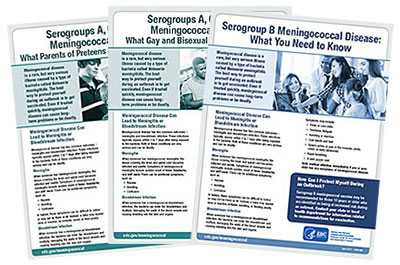Meningococcal Outbreaks
Outbreaks of meningococcal disease are rare in the United States. In fact, only about 2 to 3 out of every 100 cases are related to outbreaks. However, the onset of an outbreak is unpredictable and the outcomes can be devastating to affected communities and organizations. In certain outbreaks, CDC recommends vaccination against meningococcal disease to help stop the disease from spreading.
Outbreak Definition
An outbreak occurs when multiple cases of the same serogroup (types) happen in a population over a short time period. Outbreaks can occur in communities, schools, colleges, prisons, and other populations. Depending on the population size and specific circumstances, health officials may declare an outbreak after just two cases.
Outbreak Control Measures
State and local health departments lead outbreak investigations and implement control measures to reduce spread of the disease. They often work closely with CDC, which has published guidelines to assist with this. In the setting of an outbreak, such recommendations often include:
- Vaccinating people identified as being at increased risk
- Making sure all close contacts of a patient receive antibiotics to prevent them from getting the disease; this is known as prophylaxis
CDC supports state and local health departments in identifying a response that best protects their residents’ health. Contact the state or local health department, or institution, for information about a specific outbreak and their specific recommendations.
Vaccination
CDC recommends vaccinating people identified as being at increased risk during a meningococcal outbreak. Which vaccine they should receive depends on the serogroup causing the outbreak.

Meningococcal Disease Fact Sheets
CDC offers fact sheets about common outcomes of meningococcal disease, a rare but very serious illness. In addition to a general fact sheet, there are versions tailored with serogroup A, C, W, and Y and serogroup B vaccination information.
Outbreaks caused by serogroup A, C, W, or Y
CDC recommends vaccination with a meningococcal conjugate vaccine for anyone 2 months or older identified as being at increased risk.
Outbreaks caused by serogroup B
CDC recommends vaccination with a serogroup B meningococcal vaccine for anyone 10 years or older identified as being at increased risk.
Two vaccines provide protection against serogroup B meningococcal disease: Bexsero® (GlaxoSmithKline) and Trumenba® (Pfizer). In the setting of an outbreak, CDC recommends either two doses of Bexsero® or three doses of Trumenba®. It does not matter which brand someone receives. People should get the same vaccine brand for all doses — Bexsero® and Trumenba® are not interchangeable. If someone decides to switch brands, CDC recommends waiting at least 1 month between products and then getting the full series of the second vaccine.
Experts expect both vaccines to help protect against most serogroup B meningococcal strains circulating in the United States. However, neither vaccine will prevent all cases. Each vaccine may perform better against some strains than others, but actual effectiveness against specific strains remains unknown.
Prophylaxis
Close contacts include people in the same household, roommates, or anyone with direct contact with the patient’s saliva (such as a boyfriend or girlfriend through French kissing). CDC supports state and local health departments in identifying a response that best protects their residents’ health.
Related Pages
- Evaluation and Management of Suspected Outbreaks of Meningococcal Disease
- Use of Serogroup B Meningococcal Vaccines in Persons Ages ≥10 Years at Increased Risk for Serogroup B Meningococcal Disease: Recommendations of the Advisory Committee on Immunization Practices, 2015
- Interim Guidance for Control of Serogroup B Meningococcal Disease Outbreaks in Organizational Settings [6 pages]
- NNDSS Case Definition for Meningococcal Disease
- Page last reviewed: March 28, 2017
- Page last updated: May 4, 2017
- Content source:
- Content source: National Center for Immunization and Respiratory Diseases


 ShareCompartir
ShareCompartir